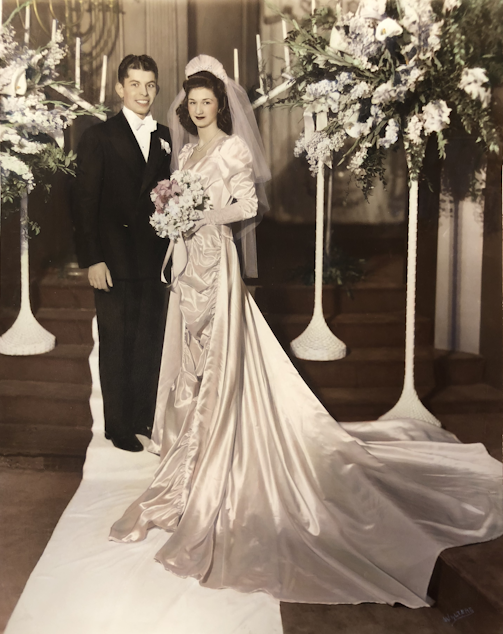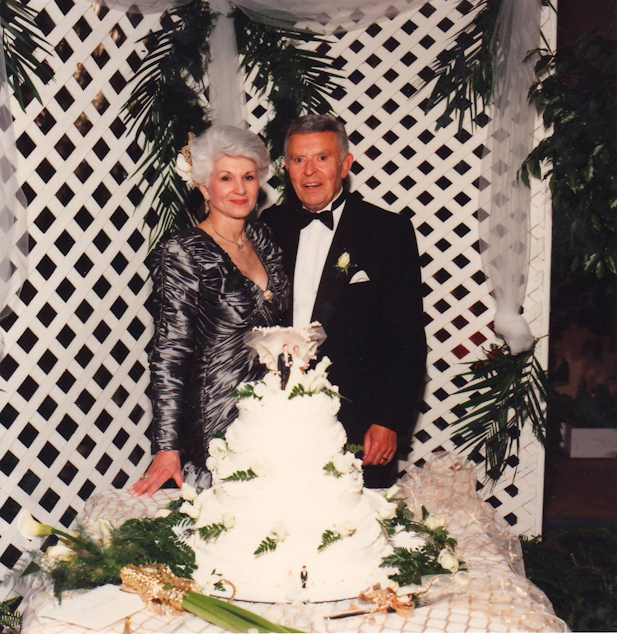Who are the Benaroyas?
The Benaroyas are classic American upstarts.
KUOW listener Jennifer Minhas’s daughter will graduate high school this spring at Benaroya Hall. A relatively recent arrival from San Diego and music lover, Minhas was curious about the story behind the venue’s name.
So who are the Benaroyas?
To answer this question, we go back to 1940 and meet 18-year-old Isaac Benaroya, who, over time, would be called Jack.
Jack lived with his parents and siblings at 150 24th Avenue in Seattle's Central District, earning $960 a year as a bookkeeper at his older brother’s wholesale beer distribution company, Consolidated Beverages, according to the 1940 U.S. Census. It was this older brother, Ralph, who had attracted his family to Seattle.
After prohibition, Ralph’s company netted major contracts, including one to distribute Anheuser-Busch beverages locally, according to the archives of the Seattle Daily Times. Jack had graduated a year earlier from Garfield High School, where he met his sweetheart, Rebecca (aka Becky) Benoun.
Sponsored
Jack and Becky, the children of Jewish immigrants, each had a parent from the Greek island of Rhodes, which at one time hosted a renowned Sephardic Jewish community that was all but wiped out in World War II.
Becky’s family had emigrated far before the war, however. Her father started as a shoe shiner at the Seattle public market, ran a tavern following the end of prohibition and eventually got into real estate, according to an interview with the Washington State Jewish Historical Society.
Becky grew up close to her grandfather who passed down wisdom in Ladino, the language of Jews of Spanish-origin.
“As a child, he tried to relate in a way that I could understand,” Becky told the Washington State Jewish Historical Society. “One story was, ‘If you pull a strand of hair from your head, can you put it back? And I said, ‘No papu (grandfather).’ He said, ‘That’s your reputation. Once it’s gone, you can never repair it.’”
At the age of 16, Becky’s parents were worried about her reputation, too, after they saw Becky going on a lot of dates. Her mother told her she could “only pick one fellow.”
Sponsored
Becky chose Jack.
“He was so respectful, and he had a job and was a very responsible young man. So we decided to go steady,” Becky said.
“My mother didn’t quit there. She said, ‘Are you taking my daughter’s time or are you serious?’ I thought he was going to run a mile a minute. And he said he was serious. And that was it. It was years later when I realized my husband never proposed.”
Valentine’s Day 1942, The Seattle Daily Times published a notice that Isaac Benaroya, age 20, intended to marry Becky Benoun, age 19.

Sponsored
Fast-forward through World War II, where Jack was stationed in the Philippines running warehousing and food operations for the Navy, and Becky was pregnant and raising their first child with the help of her sister.
After the war, Jack returned to the beer business, even though he hated it, and even though he had invented and began to mass-produce a new truck design.
“It used to take two men about 45 minutes to load a truck, and one man could do it in six or eight minutes using a lift truck and our truck body,” Jack said in a 2005 interview now archived at the University of Washington. (Jack died in 2012 at the age of 90.)
In the 1950s, Jack struck out on his own in real estate.
"He said either I could make it on my own, or I don’t deserve it," Becky said. "I told him whatever he wanted to do, I was backing him 100 percent," Becky said.
Sponsored
President Dwight Eisenhower wanted to expand the postal system through small towns, so Jack bid on – and won – federal contracts to build post offices.
“We built 'em in Cashmere, and Chelan, and Zillah, Washington. I mean all these little places you never heard of,” Jack said.
He expanded his business in the 1960s, drawing on lessons he learned in the Navy. Seattle didn’t have enough small warehouse space for new businesses, Jack said, so he decided to build more – with a twist.
“It just made sense to me that if we are building buildings, I’d rather build a large building and subdivide it and then, if a tenant moves out, you don’t have a vacant building,” Jack said.
Businesses would also have room to expand outward, if they wanted.
Sponsored
This packaging of commercial real estate into office parks – and even outlet malls – was an enormous success. Jack became the largest industrial real estate developer in the Pacific Northwest, according to his biography on HistoryLink.
In 1984, Jack sold the business for $315 million to two California pension funds and a major real estate developer just before the market tanked in what a 2001 Seattle Times article dubbed “a textbook example of buying low and selling high.”
Jack switched gears to philanthropy. (Mostly, anyway. He also invested in Howard Schultz and an early incarnation of Starbucks.)
“We had in mind that we wanted to do something for the city,” Jack said. “The city had been very good to me. So I felt that it was important, it was time to give something.”
In 1993, he got an idea from a Seattle Times article on the city’s lack of performance space.
Jack made a lunch date with the maestro of the Seattle Symphony.
Then over fruit and cottage cheese “sunburst salads” at the private Rainier Club, Jack brought up the topic.
"What would it take to get this show on the road," Jack asked the maestro. "Ten or 15 million?"
"15 million is the right number and you should give it to us," the maestro replied.
Jack agreed. Later he would joke that he should never go to lunch with the maestro again.
Jack was initially reluctant to have his name on the hall, but he was involved in its construction, down to the seats, Becky told an interviewer from the Washington State Jewish Historical Society.
"He said, 'You know, each generation is getting taller, you have to plan ahead, bigger aisles,'" Becky said. "He just thought of so many things. Everything had to be just right."
(KUOW reached out to Becky Benaroya, son Larry Benaroya, and grandson Michael Benaroya, but they declined to be interviewed for this story.)





